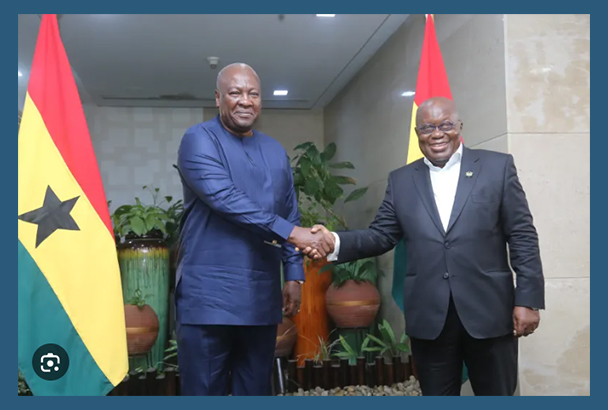The International Monetary Fund (IMF) has commended the former Akufo-Addo administration for its “key role” in stabilising Ghana’s economy and laying a credible foundation for ongoing reforms under the current Mahama-led government.
In its latest review of Ghana’s progress under the IMF-supported Extended Credit Facility program, the Fund revealed that the new government recognises the importance of its predecessor’s economic policies in restoring investor confidence and addressing deep-rooted structural weaknesses.
“The authorities [Mahama government] see the latter [Akufo-Addo government] as having played a key role in stabilising the economy and in providing a credible anchor to address long-standing vulnerabilities and buttress confidence,” the IMF stated.
This revelation comes amid renewed political sparring in Parliament, where both the National Democratic Congress (NDC) and the New Patriotic Party (NPP) have been taking credit for Ghana’s recent economic gains.
NDC MP for Amenfi West, Eric Afful, was quick to cite the country’s declining inflation rate—from 21.2% in April to 18.3% in May 2025—and a stabilising cedi as achievements rooted in legacy reforms from the previous Mahama administration.
“These gains are the result of disciplined fiscal consolidation, tighter monetary policy, and a gradual return of market confidence—all of which we started long before this current administration took over,” he stated.
However, former Information Minister and NPP MP Kojo Oppong Nkrumah challenged this narrative. He argued that the current macroeconomic improvements are driven by temporary measures, including a recent $1.4 billion injection from the Bank of Ghana’s reserves to stabilise the cedi.
“What we’re seeing now is not necessarily structural strength,” he noted. “It’s more of a short-term intervention to prevent currency freefall.”
Concerns about the sustainability of the improvements were also echoed by key figures on both sides of the aisle.
Energy Minister John Jinapor acknowledged the declining inflation but warned that it does not necessarily translate into reduced prices.
“Inflation slowing down doesn’t mean prices are coming down. It means they’re rising at a slower pace. That distinction matters to ordinary Ghanaians,” he stressed.
Dr. Kabiru Mohammed, an independent economist and policy advisor, also weighed in, describing the cedi’s current strength as an “illusion.”
“Currency appreciation triggered by central bank support, not productivity or trade surpluses, is artificial and temporary. It only delays the inevitable unless backed by structural reforms and revenue growth,” he said.
He also pointed out that the recent improvement in Ghana’s debt-to-GDP ratio is largely a result of debt restructuring—not actual economic growth.
“Let’s not confuse debt reclassification or restructuring with improved fiscal health. The fundamentals still need fixing.”
Despite political differences, the Mahama government has affirmed its commitment to the IMF program and continuity of key reforms initiated under the previous administration.
Finance Minister Dr. Theophilus Mensah has described the IMF program as “a necessary framework” to restore stability, enhance public financial management, and attract long-term investment.
“We are not here to reinvent the wheel. We acknowledge the progress made and intend to build upon it—more transparently and equitably,” he said in an address last week.
Click the link Puretvonline.com | WhatsApp Channel to join the WhatsApp channel
GOT A STORY?
Contact/WhatsApp: +233243201960 or Email: manuelnkansah33@gmail.com

